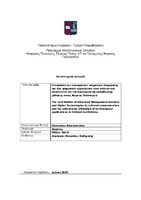Η συμβολή των προηγμένων υπηρεσιών διαχείρισης και των ψηφιακών τεχνολογιών στην πολιτιστική επικοινωνία και την προαγωγή της εκπαίδευσης - μάθησης στους χώρους πολιτισμού
The contribution of advanced management services and digital technologies to cultural communication and the educational utilization of technological applications in cultural institutions

View/
Keywords
Προηγμένες υπηρεσίες διαχείρισης ; Ψηφιακές τεχνολογίες ; Πολιτιστική επικοινωνία ; Ψηφιακό εκπαιδευτικό περιβάλλον ; Εκπαίδευση ; Μάθηση ; Χρήση νέων τεχνολογιών ; Πολιτιστική κληρονομιάAbstract
This Diploma paper is exploring the contribution of Advanced Management Services and Digital Technologies to cultural communication as well as the use and educational utilization of technological applications in Cultural Institutions. In the globalized and competitive environment of the 21st century, Cultural Organizations are called upon to respond to the challenges of the digital age and integrate new technologies into their operation. Digital communication replaces traditional forms of communication and Cultural Institutions are considered as places to promote non-conventional education and learning in the field of Culture.In this paper, the historical evolution of Culture and Cultural Industry is presented, Virtual Museums and new trends in Museology are explored in relation to the expanding role of Museum Institutions, in which the incorporation and use of innovative technologies have become educational instruments in the field of culture. Relevant research topics and issues are also discussed. Thus, digitization projects of cultural heritage and policies pursued by the European Union and our country for the protection and promotion of cultural goods are mentioned. The Digital Exhibition of the History of the Ancient Olympic Games is presented at the Old Museum of Ancient Olympia, which is a pioneer in the use of new technologies. The research section of this diploma paper is based on a research conducted in 2019 at Ancient Olympia and addressed to the visitors of the Digital Exhibition. The main focus of the Research was to identify their views on innovative technologies as tools of education and learning in the Cultural Foundations, as a means of promoting Greek Culture and their contribution to the increase of visitors to cultural institutions’ programs using new technologies. The most appropriate method that was followed in this research, was the quantitative one, using three types of questionnaires designed specifically for the school community, teachers and adults. The final conclusions of the research are formulated precisely and the proposals related to the survey’s objectives are documented.


